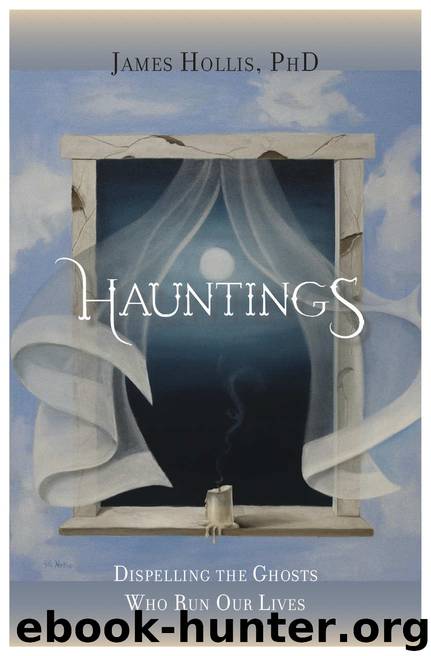Hauntings: Dispelling the Ghosts Who Run Our Lives by James Hollis

Author:James Hollis [Hollis, James]
Language: eng
Format: azw3, epub
ISBN: 9781888602630
Publisher: Chiron Publications
Published: 2013-07-17T04:00:00+00:00
Guilt as Anxiety Management System
Much more often, the state we label “guilt” is not the two forms of guilt identified above—the courageous acknowledgment of harm brought to others or our shadowy collusion with exploitation and values contrary to our professed intent. This sort of guilt, as we noted earlier, always manifests somatically, as queasiness in the stomach, a tremor of the limbs, even light-headedness. One of the signs of an activated complex is that it always manifests somatically, and while we may focus on that physical reaction and the energy coursing through us at that moment, we ignore the fact that the roots of this experience reach deeply into our psychological history and activate archaic fields of anxiety.
This activated state is often called guilt, but in fact it is an epiphenomenal reaction to a primary phenomenon, a secondary alert system to a primary sounding of anxiety's klaxon. We hear people say that they feel guilty when they say no to someone, or when they are angry, or when they fall short of parental ideals, and so on. Remember that our elementary sense of self, our internalized program of self and other, and our protective systems are all derived from disempowered times and places, messages overgeneralized, overinternalized, and subsequently reinforced by endless replication. As children, in necessary service to our narcissistic self-interest, we quickly run into the limits of our capacities, the sundry powers of the world around us, and its devastating proclivity to punish or withhold approval and affection.
For many, what was once spontaneous and natural expression becomes perilous, and we slowly grow alien to our original selves. One client spoke of how he used to sing loudly and joyously from the porch of his home until one day his mother screamed at him to shut up, and he did, thinking at that moment: “I will never sing again!” It was a silly moment and a rash conclusion, but in high school years later in a chorus alternating with gym class he was called on to sing so that the instructor could determine the right section for him. He shook with fear, opened his mouth, and nothing came out. His classmates laughed at his distress, and the instructor took his gesture as defiance and subjected him to corporal punishment, which was generally still permitted in those times. To an outsider, this incident seems trivial in the context of a larger life history, but each of us, if we have moments of insight and honesty, know that there are places in our psyche where we simply freeze and are rendered mute or grow angry and attack those around us.
From such encounters with the power principle, inevitable in the socialization process of each of us, one begins to internalize restraints, governors of our spontaneous natural expressions. Over the years one may lose contact with the psyche as a self-guiding system and slowly disconnect from the reality of one's feeling life. Since feelings are natural spontaneous reports from the psyche—we do not choose feelings, they choose us—to repress or constrict them is to collude in our self-estrangement.
Download
Hauntings: Dispelling the Ghosts Who Run Our Lives by James Hollis.epub
This site does not store any files on its server. We only index and link to content provided by other sites. Please contact the content providers to delete copyright contents if any and email us, we'll remove relevant links or contents immediately.
Rewire Your Anxious Brain by Catherine M. Pittman(17602)
Talking to Strangers by Malcolm Gladwell(11911)
The Art of Thinking Clearly by Rolf Dobelli(8873)
Mindhunter: Inside the FBI's Elite Serial Crime Unit by John E. Douglas & Mark Olshaker(7852)
Becoming Supernatural by Dr. Joe Dispenza(7123)
Change Your Questions, Change Your Life by Marilee Adams(6665)
The Road Less Traveled by M. Scott Peck(6650)
Nudge - Improving Decisions about Health, Wealth, and Happiness by Thaler Sunstein(6645)
The Lost Art of Listening by Michael P. Nichols(6485)
Enlightenment Now: The Case for Reason, Science, Humanism, and Progress by Steven Pinker(6416)
Win Bigly by Scott Adams(6329)
Mastermind: How to Think Like Sherlock Holmes by Maria Konnikova(6257)
The Way of Zen by Alan W. Watts(5813)
Daring Greatly by Brene Brown(5652)
Grit by Angela Duckworth(4748)
Big Magic: Creative Living Beyond Fear by Elizabeth Gilbert(4738)
Men In Love by Nancy Friday(4342)
Flow by Mihaly Csikszentmihalyi(4064)
The Four Tendencies by Gretchen Rubin(4031)
